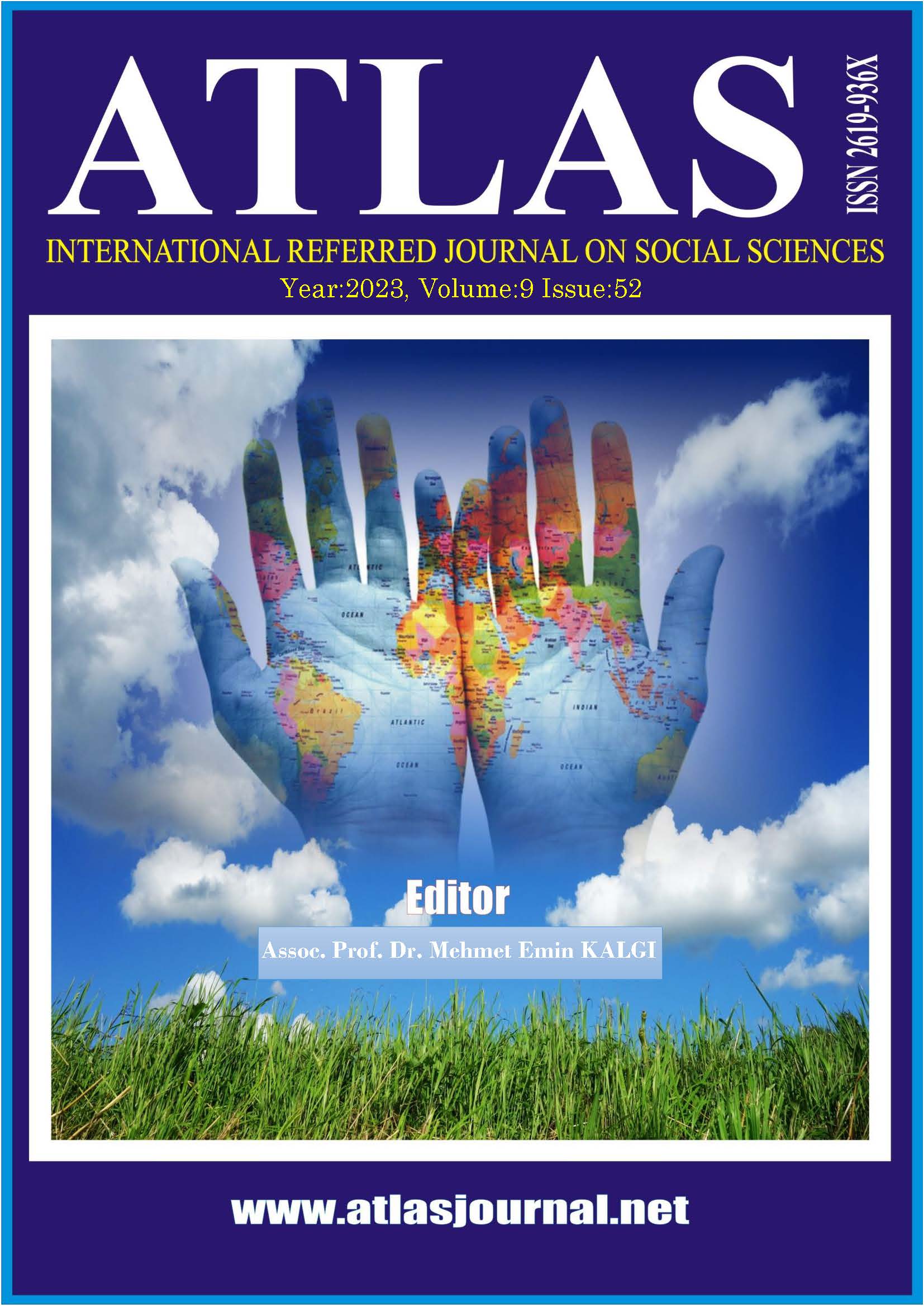The Analysis Of The Virtues Taking Place In The Secondary Education Geography And Logic Courses
DOI:
https://doi.org/10.5281/zenodo.10396040Keywords:
Geography, Logic, Secondary Education, Virtues, CoursebookAbstract
Coursebooks are one of the most commonly used materials. For that reason, they guide teaching process to a great extent. As for virtues, they are one of the most basic concepts used by social sciences. These universal virtues that are owned by all humanity in common sense are made to attain to students by means of course books. Therefore, there is a large literature regarding virtues. One of the social sciences contributing to the formation of literature is High School Geography 1 and Secondary Education Logic. For this reason, the current study was carried out to determine to what extent virtues take place in the secondary education coursebooks of geography and logic. For the data collection of the study, the course book the Board of Education as High School Geography 1 course book based on pass grade and credit system for five years with date of 23.05.2003 and no of 145 and the course book the Board of Education as coursebook with a date of 08.09.1995 and a no of 319 were investigated. As a result, the investigation, twentyfive virtues of ‘Kindness’, ‘Aesthetic’, ‘Friendship’, ‘Cleanliness’, ‘Helping Each Other’, ‘Love’, ‘Responsibility’, ‘Freedom’, ‘Industriousness’, ‘Cooperation’, ‘Family’, ‘Modesty’, ‘Hospitality’, ‘Respect’, ‘Solidarity’, ‘Justice’, ‘Peace’, ‘Honesty’, ‘Patriotism’, ‘Companionship’, ‘Spiritual and Cultural Components’, ‘Nature’, ‘Happiness’ and ‘Religious Culture Components’ were scanned and investigated. These twenty-five virtues that were determined in written and visual expressions in the secondary education coursebooks of Geography and Logic were scanned and how often these virtues were given place in the course books were tried to be determined. At the end of the evaluation, it was found that the mostly used virtues in the geography coursebook were ‘Spiritual and Cultural Components’, ‘Patriotism’, ‘Religious Culture Components’ and ‘Responsibility’. As for the coursebook of Secondary Education Logic, the virtues of ‘Industriousness’, ‘Nature’, ‘Responsibility’ and ‘Aesthetic’ were the mostly used virtues. The common virtues that were not given a place in both coursebooks were ‘Cleanliness’, ‘Modesty’, ‘Hospitality’, ‘Respect’, ‘Justice’ and ‘Peace’. In this sense, it is thought that the current study will contribute to the related literature in terms of investigating the virtues taking place in the coursebooks of High School Geography and Secondary Education Logic.
References
Aras, S.; Duru, A.; Benligirayoğlu, İ.; Durak, S. & Kılıçarslan, S. (2003). Lise Coğrafya 1. İstanbul: Milli Eğitim Basımevi.
Bacanlı, H. & Dombaycı, M. A. (2012). Değer Eğitiminde Değer Boyutlandırma Yaklaşımı. (Ed. Kaymakcan, R.; Tınaz, N.; Altın, Z. Ş.; Zengin, M.; Okudan, A. Y. & Yiğit H.), Değerler ve Eğitimi- II, ss. 889-912, İstanbul: Değerler Eğitimi Merkezi.
Bozkoyun, M. (2022). Türkiye'deki Coğrafya bölümlerinde Arazi Kullanımı Üzerine Yapılmış Lisansüstü Tezlere Yönelik Bir İçerik Analizi (Ed. Çiftçi, H. & Demirdöğmez, M. & Erdoğan, M.), Sosyal Bilimlerde Seçme Konular-8, ss. 81-100, Ankara: İKSAD
Çifçi, T. (2018). Coğrafya'da Değer Eğitimi. Ankara: Pegem Akademi.
Değirmenci, Y. (2018). Coğrafya Dersi Öğretim Programında Değerler, Tarih Kültür ve Sanat Araştırmaları Dergisi, 7(1), 429-450.
Duman, E. Z. & Arslan, A. (2022). Ortaöğretim Mantık Ders Kitabında Değerlerin Analizi", (Ed. Ekrem Ziya Duman), Felsefe Grubu Eğitimi Alanında Çalışmalar, ss. 81-98, Ankara: Nobel Akademik Yayıncılık.
Duman, E. Z. & Küçükşabanoğlu, Ö. (2017). 2009 Mantık Dersi Öğretim Programına Göre Yazılan Mantık Ders Kitaplarında Örtük Müfredat, Journal of Research in Education and Teaching, 6(1), 19-25.
Girgin, Y. (2011). Cumhuriyet Dönemi (1929-1930, 1949,1981) Ortaokul Türkçe Öğretimi Programlarının İçerik, Genel ve Özel Amaçlarıyla Karşılaştırmalı Gelişim Düzeyi, Adnan Menderes Üniversitesi Eğitim Fakültesi Eğitim Bilimleri Dergisi, 2(1), 11-26.
Güngör, E. (2010). Değerler Psikolojisi Üzerinde Araştırmalar. İstanbul: Ötüken Yayınları.
Karaoğlan, S. (2021). Ortaöğretim Mantık Ders Kitaplarında Yer Alan Değerler Üzerine İnceleme (Ed. Duman, E. Z. & Manav, F.), Felsefe Grubu Eğitimi Araştırmaları, ss. 161-180, Ankara: Pegem Akademi.
Karasar, N. (2002). Bilimsel araştırma yöntemi, Nobel Yayınları, Ankara.
Köksal, K.; Kılıç, Z. Y.; Yel, Ü.; Erbaş, S. & Kılcan, B. (2022). "Sosyal Bilgiler Ders Kitaplarının Kök Değerler Açısından İncelenmesi", International Journal of Academic Research, 5(2): 74-87.
Kuçuradi, İ. (2018). İnsan ve Değerleri. Ankara: Türkiye Felsefe Kurumu.
Millî Eğitim Bakanlığı. (1992). Coğrafya 1,2 Programı. Ankara: Talim ve Terbiye Kurulu Başkanlığı.
Millî Eğitim Bakanlığı. (1993). Mantık I Dersi Öğretim Programı. Ankara: Milli Eğitim Basımevi.
Schwartz, S. H. (1992). Universals in the Content and Structure of Values: Theoretical Advances, (Ed. Mark P. Zanna), In Advances In Experimental Social Psychology, ss. 1-65, San Diego: Academic Press.
Sözer, E. (1998). Kuramdan Uygulamaya Sosyal Bilimler Öğretimi, Eskişehir: Anadolu Üniversitesi Yay.
Şahin, V. & İnce, Z. (2021). Coğrafya Derslerinde Etik Değerler Öğretimi Üzerine Bir İnceleme, Sosyal Bilgilerde Yenilikçi Araştırmalar Dergisi, 4(1), 1-11.
Yalçınkaya, M. (2016). Mantık ve Değerler Eğitimi. Yüksek Lisans Tezi, YÖK Ulusal Tez Merkezi. (Tez no:459482)
Yaman, E. (2012). Değerler Eğitimi. Ankara: Akçağ Yayınevi.
Yamanlar, E. (1996). Mantık, Ders Kitapları Anonim Şirketi, İstanbul.
Yaşaroğlu, C. (2013). Türkiye’deki “Hayat Bilgisi” ile Singapur’daki “Vatandaşlık ve Ahlak Eğitimi” Derslerinin Değerler Eğitimi Bağlamında Karşılaştırılması, Turkish Studies, 8(8), 1453-1461.
Yıldırım, A., & Şimşek, H. (2016). Sosyal Bilimlerde Nitel Araştırma Yöntemleri. Ankara: Seçkin Yayıncılık.
Zabun, B. (2013). Değerlerin Sosyolojik Öğretimi: Ortaöğretim Sosyoloji Ders Kitaplarında Yer Alan Değerlerin Analizi, Akademik Bakış Dergisi, 1-11.
Downloads
Published
Versions
- 2024-01-08 (2)
- 2023-12-25 (1)
How to Cite
Issue
Section
License
Copyright (c) 2023 Atlas Journal

This work is licensed under a Creative Commons Attribution-NonCommercial 4.0 International License.


